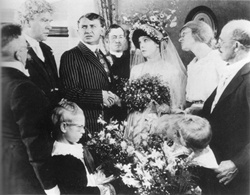Is It Really a Great Movie? Part Thirty: Greed
by dan heaton
Using Roger Ebert's Great Movies book as a guide, this series of articles will focus on all films included on his list that previously have escaped my notice. Since all lists are subjective, I am not treating Ebert's choices as the essential selection of films. However, his essays offer the perfect chance for me to explore both classics and lesser-known pictures from around the globe.

Greed may not be commonly known to many audiences, but it remains one of the most notorious lost pictures for critics. Directed by Austrian Erich von Stroheim, its running time was originally more than nine hours and eventually cut to five by the director. MGM would not release such a lengthy film, so they took it away and severely edited it down to about 140 minutes. Stroheim denounced the picture, and the deleted footage was never discovered. Even considering its limited visibility, this picture was added to the National Film Registry in 1991 and is considered a classic by many experts. Based on the Frank Norris novel McTeague, this epic still feels long, which makes me wonder if the original really would have been considered a masterpiece. In 1999, Turner Entertainment did create a four-hour version using still photographs of the deleted scenes and following Stroheim’s original outline. I screened the British VHS release from the ‘80s, so it did not contain these extra moments.
Before this viewing, I had never heard of this film or its history, which allowed me to enter with a fresh perspective. It was quickly apparent that Stroheim had more ambitious aims than the typical silent film. The production values are much higher and avoid the closed-in, interior environment of many early pictures. The story focuses on the uncultured McTeague (Gibson Gowland), who throws a man off a mining ledge during his first on-screen appearance. After learning the practice from a charlatan, he becomes a dentist and opens his own business. McTeague’s life is fairly uneventful until the arrival of Trina (Zazu Pitts), a fairly common-looking girl who rides with his friend Marcus. In a short time, McTeague wins her love and proposes marriage. Just prior to the big event, Trina wins a large amount of money and becomes extremely miserly. This trait brings her into conflict with McTeague and sends him down a tragic path.
In its first hour, Greed showcases inventive sequences that are both outlandish and innovative. Critics found some of the blatant violence, crude behavior, and implied sex (tame by today’s standards) scandalous, but their appearance makes the film less dated. A particularly memorable sequence is the wedding reception, which includes one of my favorite movie title cards ever: “And then, for two full hours, they gorged themselves.” This title is followed by lengthy shots of the family gnawing on giant hunks of meat and looking particularly nasty as they devour lots of food. Next up is the wedding night, where Trina acts totally crazy when her husband wants to consummate the marriage. After becoming a comedy, the film now shifts into horror mode and turns McTeague into a predator. It reminds me of a similar eerie scene from Night of the Hunter, which leads to much-different results. These outlandish scenes help the story to rise above basic melodrama, but their unpredictable energy won’t return as we downshift into a dull middle act.
Roger Ebert actually spends most of his Great Movies review discussing the film’s history and comments only briefly about the actual movie. The story of Stroheim’s battle with the studio is intriguing, but the focus on this aspect reveals a flaw with this inclusion. There are epic ambitions at work and some enjoyable moments, but the overall experience is only average. When McTeague and Marcus finally reach Death Valley and have their ultimate confrontation, we’re too worn out to be inspired. These moments are visually impressive and function nicely, but their effect is diminished by the dull preceding hour. Trina’s obsession with saving money and her conflict with McTeague is interesting for a while, but little happens for a long period of time. These issues could relate to the studio editing, but I can’t imagine a super-long version would be an improvement. Greed’s unique history deserves our interest, but that does not make it a Great Movie.
Copyright (c) 2007 erasing clouds |
|